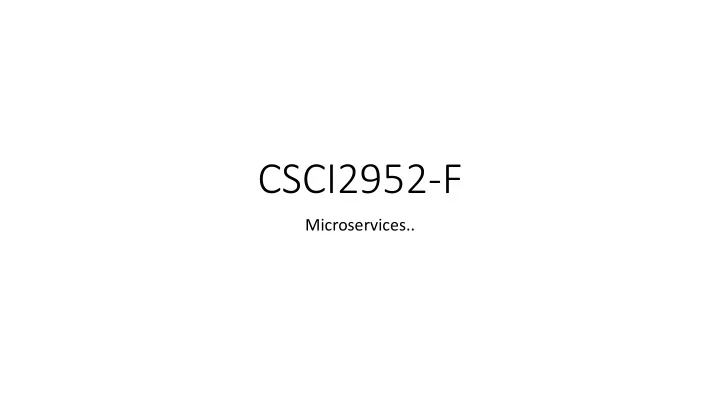

CSCI2952-F Microservices..
Class Staff Prof Theo Benson HTA: Saim Salman
What is a Microservice? • “A particular way of designing software applications as suites of independently deployable services” --MartinFowler
Monolithic Distributed Service Micro Function- Program systems Oriented service as-a (CSCI1380) Architecture Service (lambda)
Monolithic Distributed Service Micro Function- Program systems Oriented service as-a (CSCI1380) Architecture Service (lambda)
Course Objectives • Microservices: next generation of cloud deployments • Application decoupled and deployed in containers • Multiple benefits of decoupling • Independent code evolution • Teams can deploy and push independently • Polyglot: each service in a different language • Better resource management • Independent allocation of resources • Independent scaling of resources • Better Fault tolerance and security
Course Objectives • Microservices: next generation of cloud deployments • Application decoupled and deployed in containers • Multiple benefits of decoupling • Independent code evolution • Teams can deploy and push independently • Polyglot: each service in a different language • Better resource management • Independent allocation of resources • Independent scaling of resources • Better Fault tolerance and security
• Service Discover? • Name to IP • Which instance • Security • Rolebased Access control • Debugging Issues Function to function è Function call Function to function è RPCs • Configuration issues • Manage security conf • Manage loadbalancing conf
• Service Discover? • Name to IP • Which instance • Security • Rolebased Access control • Debugging Issues Function to function è Function call Function to function è RPCs • Configuration issues • Manage security conf • Manage loadbalancing conf
• Service Discover? • Name to IP • Which instance • Security • Rolebased Access control • Debugging Issues Function to function è Function call Function to function è RPCs • Configuration issues • Manage security conf • Manage loadbalancing conf
Service Mesh For Blue container: Restrict access to green • • Two parts Make 5 copies • • Control plane This is the location of the • • Data plane orange container Collect logs files • • Data plane • One for each container ControlPlane • Intercepts all packets from (Istio) container and does magic • Control plane • Tell the data plane which magic to do for which container
Service Mesh: Data plane in a little detail • Two parts • Control plane • Data plane • Data plane (called a proxy) • One for each container • Intercepts all packets from container and does magic • Control plane • Tell the data plane which For Blue container: magic to do for which Restrict access to green • container Make 5 copies • • This is the location of the orange container • Collect logs files
Course Objectives • Identify and cover topics at the forefront of microservices infrastructure development • What are microservices infrastructure components? • How are they different/similar to traditional components? • What interfaces/abstractions do these components expose to App Developers? • Investigate cutting edges issues and emerging solutions • Managing microservices deployments • Providing SLA/SLO guarantees • Observability of microservice • Debugging and Diagnosis • Storage
Course Outline • Identify and cover topics at the forefront of microservices infrastructure development Background SLA Observability Diagnosis Open issues (2 Weeks) (2 Weeks) (2 Weeks) (2 Weeks) (2 Weeks)
Course Syllabus • Project: 50% • Groups of 2-3 • Investigate and develop advances to microservices infrastructure • Paper readings and Presentations (14-16 readings: allowed to skip 4) • Paper summary: 15% • Leading paper: 10% • Assignments: 20% • Class participation: 5%
Class Structure and Readings (begin Day 4) • On the website each class has: Tips on reading and writing paper • Required reading reviews can be found here: How to Read a Paper • • A recommended video How to read a research paper • • 2-3 optional readings • All students should read and write a summary for required reading • The students leading the discussion should … • Read both required and optional readings • Make a power point presentations (40-45 mins) • Not required to submit a reading
Assignments HW #1: Hello World! HW #2: Virtual Kubecon HW #3: Operator HW #4: Overload Problems Prevention
Projects • A chance to change the world!!!! • A few options • Reimplement a closed source idea • Extend an open source idea • Investigate a new idea • Explore an existing idea within the microservices domain • We will provide a list to choose from
Next Class • We will cover more buzz words • API Gateway • YAML! • Istio/Envoy • eBPF/Cilium • Containers (Kubernetes) • Later in the semester we will cover these buzz words • Distributed tracing (Jaegar/zipkin) • Observability
Questions??
Recommend
More recommend